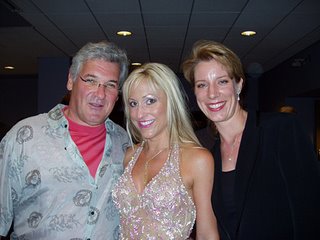Shostakovich Postponed, Zukerman to the Rescue
 Rostropovich's absence from the rostrum this week must have left many listeners hoping for Maxim Vengeroff and Schostakovich disappointed. Although Mr. Rostropovich's state of health is precarious in general, there is still hope that much of the Shostakovich Birthday party will be preserved for later this season. Happy 101st! Meanwhile, Pinchas Zukerman kindly agreed to fill the empty slot as soloist and conductor. From the slew of options he threw at the NSO management (his WGMS interview is excerpted here), Wagner's Meistersinger prelude, Bruch's Kol Nidrei, Mozart's Fifth Violin Concerto, and Beethoven's Second Symphony were chosen.
Rostropovich's absence from the rostrum this week must have left many listeners hoping for Maxim Vengeroff and Schostakovich disappointed. Although Mr. Rostropovich's state of health is precarious in general, there is still hope that much of the Shostakovich Birthday party will be preserved for later this season. Happy 101st! Meanwhile, Pinchas Zukerman kindly agreed to fill the empty slot as soloist and conductor. From the slew of options he threw at the NSO management (his WGMS interview is excerpted here), Wagner's Meistersinger prelude, Bruch's Kol Nidrei, Mozart's Fifth Violin Concerto, and Beethoven's Second Symphony were chosen.
The Wagner was sumptuous, rich, and smoothly flowing in the lyrical moments; but wearing fairly heavy boots elsewhere. Bruch's Kol Nidrei is so popular, beautiful, and present in the listener's perception, that he is often thought to be Jewish himself. Not that it matters one way or the other (he is not) - but this phenomenon might say something about how heartfelt the music sounds. Soloist Amanda Forsyth displayed a perfectly smooth, beautifully round, almost loose sound on her cello. A few missed spots were of no consequence to a polished, if not very probing performance.
After the Schiff-treatment of Mozart, it is admittedly difficult to return to the proper, well executed, but gluten-rich way the NSO has with it. "Mozart, the Romantic" sounded closer to the neighborhood of Mendelssohn and Bruch than Haydn under Mr. Zukerman's guidance. His involved, sturdy playing had much to do with that. A very long Adagio was surrounded by a fine, heavy first movement and a slacking Rondo, tempo di menuetto that didn't necessarily need to be faster, but more lively. Interestingly enough, Mr. Zukerman's performance did not showcase precision as its primary aim.
Daniel Ginsberg, The NSO's Rewarding Change in Plans (Washington Post, November 03) |
Here it was the latter - but not to the detriment of the symphony. Well played, it had a strutting confidence in the first movement, produced a little-big storm in the third (Scherzo: Allegro), and a blast in the fourth (Allegro molto). The beauteous second movement was curvaceous, well shaped, calming, and endowed with a sturdy rhythm.
[On the subject of Amanda Forsyth, Norman Lebrecht's column for La Scena Musicale earlier this month relates an interesting story. -- Ed.]




















































